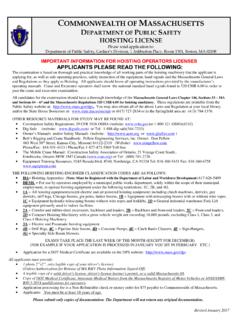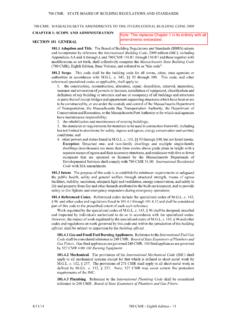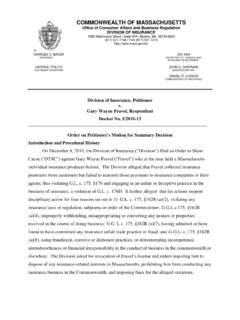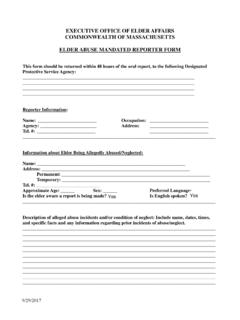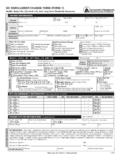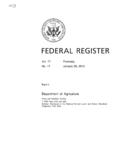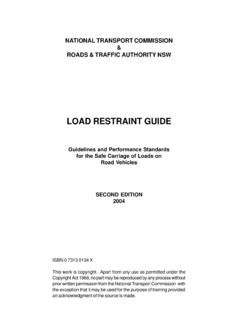Transcription of OFFICE OF THE ATTORNEY GENERAL - mass.gov
1 Last Updated: March 1, 2018 OFFICE OF THE ATTORNEY GENERAL AN ACT TO ESTABLISH PAY EQUITY: OVERVIEW AND FREQUENTLY ASKED QUESTIONS TABLE OF CONTENTS OVERVIEW OF THE LAW .. 2 FREQUENTLY ASKED QUESTIONS .. 4 SECTION 1: COVERED EMPLOYERS .. 4 SECTION 2: COVERED EMPLOYEES .. 4 SECTION 3: DEFINITION OF COMPARABLE WORK .. 5 SECTION 4: DEFINITION OF WAGES .. 8 SECTION 5: PERMISSIBLE VARIATIONS IN PAY .. 9 SECTION 6: RESTRICTIONS ON DISCUSSION OF WAGES PROHIBITED .. 12 SECTION 7: SEEKING SALARY HISTORY PROHIBITED .. 13 SECTION 8: RETALIATION PROHIBITED.
2 15 SECTION 9: LIABILITY AND ENFORCEMENT .. 15 SECTION 10: AFFIRMATIVE DEFENSE FOR EMPLOYER SELF-EVALUATIONS .. 17 APPENDIX A: SELF-EVALUATIONS A BASIC GUIDE FOR EMPLOYERS .. i APPENDIX B: SAMPLE CHECKLIST POLICIES & PRACTICES REVIEW .. v APPENDIX C: AN ACT TO ESTABLISH PAY EQUITY .. viii This guide provides information on an Act to Establish Pay Equity, Chapter 177 of the Acts of 2016, which will update and replace c. 149, 105A, effective July 1, 2018. This guide does not constitute legal advice. 2 OVERVIEW OF THE LAW In 1945, Massachusetts became the first state in the country to pass an equal pay law.
3 But the gender pay gap persists in Massachusetts and across the country. In Massachusetts, on average, women working full time earn only of what men The gap is even larger for some women of On July 1, 2018, an updated equal pay law will go into effect in Massachusetts, providing more clarity as to what constitutes unlawful wage discrimination and adding protections to ensure greater fairness and equity in the workplace. The statute, Chapter 177 of the Acts of 2016, An Act to Establish Pay Equity, amends the Massachusetts Equal Pay Act, c.
4 149, 105A ( MEPA ). Equal Pay for Comparable Work MEPA generally provides that No employer shall discriminate in any way on the basis of gender in the payment of wages, or pay any person in its employ a salary or wage rate less than the rates paid to its employees of a different gender for comparable work. The law defines comparable work as work that requires substantially similar skill, effort, and responsibility, and is performed under similar working conditions. MEPA permits differences in pay for comparable work only when based upon: (i) a system that rewards seniority with the employer (provided, however, that time spent on leave due to a pregnancy-related condition and protected parental, family and medical leave, shall not reduce seniority); (ii) a merit system; (iii) a system which measures earnings by quantity or quality of production, sales, or revenue; (iv) the geographic location in which a job is performed.
5 (v) education, training or experience to the extent such factors are reasonably related to the particular job in question; or (vi) travel, if the travel is a regular and necessary condition of the particular job. Importantly, MEPA makes clear that employees salary histories are not a defense to liability. Moreover, an intent to discriminate based on gender is not required to establish liability under the law. 1 Bureau of Labor Statistics, BLS Reports: Highlights of Women s Earnings in 2016 (August 2017), Table 3 (comparing median earnings), available at 2 Id.
6 At 3-4; see also National Partnership for Women & Families, Fact Sheet: Massachusetts Women and the Wage Gap (April 2017), available at 3 Affirmative Defense An employer that violates MEPA generally will be liable for twice the amount of the unpaid wages owed to the affected employee(s) the differential between the employee s wages and the wages paid to an employee of a different gender performing comparable work plus reasonable attorneys fees and costs. However, the law provides a complete defense for any employer that, within the previous three years and before an action is filed against it, has conducted a good faith, reasonable self-evaluation of its pay practices.
7 To be eligible for this affirmative defense, the self-evaluation must be reasonable in detail and scope and the employer must also show reasonable progress towards eliminating any impermissible gender-based wage differentials that its self-evaluation reveals. Employers are not required to conduct self-evaluations and will not be penalized for choosing not to do so. Other Key Provisions MEPA also adds several key protections for employees and job applicants: Employers may not prohibit employees from disclosing or discussing their wages.
8 Employers may not seek the salary or wage history of any prospective employee before making an offer of employment that includes compensation, and may not require that a prospective employee s wage or salary history meet certain criteria. Employers may not retaliate against any employee who exercises his or her rights under the law. Employees whose rights under MEPA have been violated have three years from the date of an alleged violation to bring an action in court. A violation occurs when a discriminatory compensation decision is made or other practice is adopted, and each time an employee is affected, including each time wages are paid.
9 4 FREQUENTLY ASKED QUESTIONS SECTION 1: COVERED EMPLOYERS Q: Which employers are covered by MEPA? MEPA covers nearly all employers in Massachusetts, including state and municipal employers, irrespective of size. It does not apply to the federal government as an employer. Q: Does MEPA apply to employers located outside of Massachusetts? Yes, if they have employees with a primary place of work in Massachusetts. SECTION 2: COVERED EMPLOYEES Q: Which employees are covered by MEPA? For purposes of MEPA, an employee is defined as any person employed for hire by an employer in any lawful employment.
10 , with very limited exceptions for babysitters and other domestic workers under age eighteen, agricultural workers, and employees of social clubs and similar associations. c. 149, 1. This definition covers the vast majority of employees, including full-time, part-time, seasonal, per-diem, and temporary employees. Q: Does MEPA apply to government employees? Yes. MEPA applies to state and municipal employees. It does not, however, apply to employees of the federal government. Q: Does MEPA apply to employees who live or work outside of Massachusetts?
